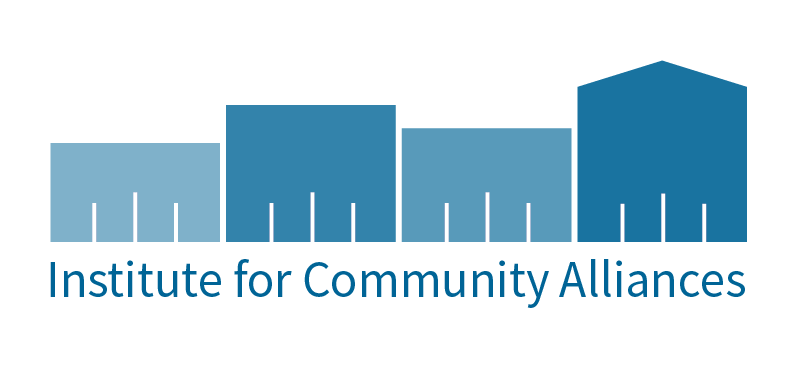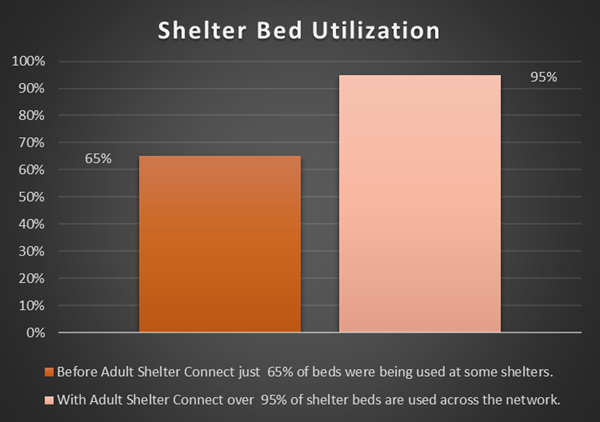CASE STUDY
____________________
Adult Shelter Connect – Removing Barriers and Creating a Better Shelter System
Background
In 2015, Hennepin County Minnesota was in year nine of a ten-year plan to end homelessness. Still, there had been little to no improvement in the way single adults gained access to emergency shelter.
There was overcrowding in some facilities. At the same time, beds at other agencies were empty. And, for many who were on the streets and homeless, getting into shelter had become a matter of luck.
If “Janelle”, with poor circulation from diabetes, was aware she needed to get in line soon enough and was able to stand for long enough she might get a bed on a freezing cold February night.
If “Jose”, a Veteran with memory issues, remembered to show up at the right facility at the right time and drew the right “lottery” number, he would be one of the fortunate to get out of the stifling August heat and away from mosquitoes for a few hours.
For both Jose and Janelle, the morning after getting into shelter generally would begin a repeat of the day before – and they were likely to again be among hundreds of others consumed by the uncertainty of where they would sleep the next evening.
Shelter represents so much more than just a bed. Shelter is a place for being safe. It provides rest for exhausted bodies and anxious minds. Shelter often means access to much-needed food, a shower and restroom, fresh clothes, help getting medical care and so much more. In some cases, shelter truly can be the difference between living or dying.
Hennepin County and the shelters knew they must do better.
Redirecting Community Efforts
The Adult Shelter Connect (ASC) concept grew out of the Single Adult Shelter Redesign initiated in 2015 and launched in July 2016 by a committed group of five adult shelters in Hennepin County. The key goals of the Redesign plan were to address the barriers and issues noted above. The shelter collaborative believed that Minnesota’s Homeless Management Information System (HMIS) could be used to coordinate services and improve access to shelters through the ASC.
The Institute for Community Alliances agreed.
How ICA Helped
Designated as Minnesota’s new HMIS Lead Agency in June 2016, the Institute for Community Alliances was uniquely positioned to support the data management and sharing that would be required for the ASC concept to become a reality.
Working closely with the shelter group, in less than eight weeks ICA provided the expertise and resources needed to customize and activate the HMIS for the Adult Shelter Connect project.
A Better Shelter System Through Shared Data Management
Aligning with national best practices, The Adult Shelter Connect has successfully functioned as the centralized entrance into the network of single adult emergency shelters in Hennepin County since its activation in October 2016.
By the Spring of 2017, more than 85,000 bed reservations had been made for nearly 4,700 unique guests. Of these reservations, close to 80% were made at shelters by guests returning the following evening, helping to break the cycle of daily upheaval previously experienced by guests like Jose and Janelle. By October 2018, over 318,000 reservations had been made in the system, with 11,560 people assisted.
There are no long lines. The “lottery” selection process is gone. Participant needs are assessed and prioritized through a coordinated and uniform process. Guest photo identification cards, referred to as Community Cards, simplify and accelerate entry into shelter and can be used to access any facility across the newly-defined system. Where possible and appropriate, people are diverted from entering the homeless system.
“Before (ASC) I wasn’t able to do anything during the day because I was constantly worried about getting in line in time to get a (shelter) bed. Now, I know I have a bed and I am going to the library and applying for jobs.” – Anonymous shelter guest
Unexpected (and very inspiring) Community Benefits
The reach of the ASC project has grown exponentially. Across Hennepin County, Community Cards have become so much more than just a way to reserve a bed or check into a shelter.
The cards are now accepted at city libraries and provide access to the metropolitan transit system. Hennepin County Healthcare for the Homeless and the Minneapolis/Hennepin County Continuum of Care Coordinated Entry system are working with the ASC and single shelters to pass along information and stay in touch with clients. The shelter collaborative is using shared data to assist with care coordination, helping ensure that assessments, case management and services are provided for “quiet” clients who in the past may have unintentionally been overlooked.
Solution Partners
Hennepin County Office to End Homelessness
Catholic Charities Higher Ground Shelter
Our Saviour’s Housing
St. Stephen’s Human Services
Salvation Army Harbor Light Center
Simpson Housing Services
Hennepin County and the shelters have indeed found a way to do better!
Previously, some shelters used as few as 65 percent of beds on a given night. Now, across the system, bed utilization ranges from 95-98%.
The Adult Shelter Connect has become a proven community-based service delivery model to reduce barriers and streamline access to services and resources for single adults experiencing homelessness.
Next Up
____________________
Homeless No More – A “Real-time” Data Strategy
Des Moines, Iowa was one of the first cities to sign on to First Lady Michelle Obama’s challenge to U.S. mayors to end Veteran homelessness. As the Homeless Management Information System (HMIS) Lead for Des Moines since 2001, the Institute for Community Alliances was naturally positioned to organize and lead the initiative.


